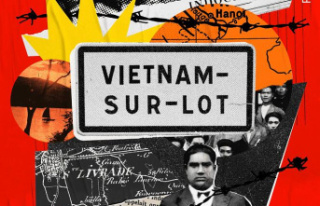Elisa took out her floral dress, her woven straw hat and her pretty earrings to go vote on Thursday, November 16, in Andavamamba, a district in the west of Antananarivo, the Malagasy capital. She makes no secret of it: as in 2018, her vote is for Andry Rajoelina, the outgoing president, candidate for re-election in a vote marked by a call for a boycott from almost the entire opposition.
The 72-year-old former street vendor is convinced that it is thanks to the head of state that she was able to receive 100,000 ariary (around 22 euros) as part of the Tosika-Fameno social program introduced at the time of the Covid-19 crisis and financed by the World Bank. Thanks to him too, she received 100,000 ariary to deal with the damage caused by the passage of cyclone Batsirai in February 2022.
These subsidies represent a fortune for families whose income does not exceed a few thousand ariary per day, in a country where the poverty rate exceeds 75% of the population, according to the World Bank. “It had never happened that a manager took care of us, in the slums,” enthuses Emma, 40 years old and a washerwoman by profession, a counterfeit bucket hat with the Louis Vuitton logo on her head.
The participation rate promises to be low
Until the last hours of the campaign, Andry Rajoelina deployed considerable resources to try to obtain a second term in the first round, bringing together thousands of supporters in a stadium on Sunday November 12. Transparency International, which issued a press release on the evening of the vote, estimated the president-candidate's campaign expenses at 27.1 million euros and estimated that nearly 10 million were suspected of having been used for "electoral corruption ".
But the excitement observed among Andry Rajoelina’s supporters was not shared by the 11.5 million voters – out of a population of 29 million inhabitants. Boycott obliges, the participation rate promises to be low. “People came to vote at the end of the morning and now it’s trickling down,” notes Arlette Raveloarisoa, one of the presidents of the Ampefelihoa voting center, with 2,543 registered voters. While the first official estimates were not yet available, the “collective of 10”, bringing together the opponents, announced, when the polling stations closed, that, according to their estimates, participation was around 20%. . The Safidy civil society observatory put forward a figure of 22.4%.
The lack of attendance at the polling stations was evident in certain neighborhoods such as that of Faravotra, in the center of the capital, a stronghold of the former head of state and candidate Marc Ravalomanana, who also decided to do not vote. Throughout the day, photographs of deserted or rarely used offices were shared on social networks.
The opposition warned against fraud
A sign of the tense climate in which the vote took place, large contingents of gendarmes and police officers had been positioned on the Place du 13-May, in anticipation of possible protest movements. The opposition warned against fraud, especially as the World Council of Christian Churches (FFKM) chose not to deploy its network of observers, the largest in the country, to monitor the conditions of the vote.
On Thursday, one of the rare independent observers present in the center of Andavamamba to monitor the progress of operations was indeed doubtful when examining the bulletin. “The ballot number appears only on the stub of the book used by the assessor, but it is not written on the paper that the voter slips into the ballot box. This opens the door to fraud. It is impossible to verify if the voter slips another pre-marked ballot in favor of a candidate who would have paid him,” he remarked.
Apart from Andry Rajoelina, only Sendrison Daniela Raderanirina, candidate number 11, and Siteny Randrianasoloniaiko, number 13, took part in the campaign. The other opposition figures, grouped within the "collective of 10", have stepped up their marches to protest against the candidacy of the outgoing president, whom they criticize in particular for having, as revealed by several media outlets, including Le World, voluntarily acquired French nationality – which, according to national law, strips him of his Malagasy nationality.
At the end of the day, the collective, through the voice of candidate Hajo Andrianainarivelo, declared that it did not “recognize these elections”, given the participation “at the lowest in the history” of the country. The results of this first round are not expected for several days. The curfew was maintained for the night from Thursday to Friday.












